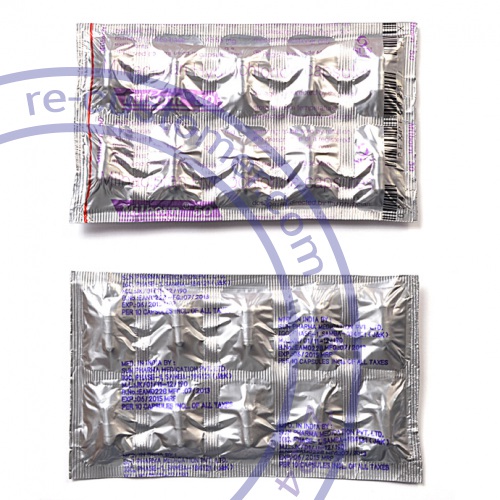
Antidepressants, Muscle Relaxants, Neurological Disorders
Manufacturer: Milna / Sun Pharmaceutical Industries Ltd.
Disease(s): Chronic Pain Disorder / Fibromyalgia
| Package | Price | Per tablet | Savings | Order |
|---|---|---|---|---|
| 50mg × 120 tablets | $ 131.95 | $ 1.10 | $ 47.45 | Add to cart |
| 50mg × 90 tablets | $ 98.95 | $ 1.10 | $ 35.60 | Add to cart |
| 50mg × 60 tablets | $ 71.95 | $ 1.20 | $ 17.75 | Add to cart |
| 50mg × 30 tablets | $ 38.95 | $ 1.30 | $ 5.90 | Add to cart |
| 50mg × 20 tablets | $ 27.95 | $ 1.40 | $ 1.95 | Add to cart |
| 50mg × 10 tablets | $ 14.95 | $ 1.49 | Add to cart |
Milnacipran capsule
What is this medicine?
MILNACIPRAN affects certain chemicals in the brain called neurotransmitters. An abnormality in these chemicals is thought to be related to fibromyalgia. Milnacipran is not used to treat depression but how it works in the body is similar to how some antidepressants work.
Milnacipran is used to treat a chronic pain disorder called fibromyalgia.
What should I tell my health care provider before I take this medicine?
Do not use Milnacipran together with thioridazine (Mellaril), or an MAO inhibitor such as isocarboxazid (Marplan), tranylcypromine (Parnate), phenelzine (Nardil), rasagiline (Azilect), or selegiline (Eldepryl, Emsam). Serious and sometimes fatal reactions can occur when these medicines are taken with Milnacipran. You must wait at least 14 days after stopping an MAO inhibitor before you can take Milnacipran. After you stop taking Milnacipran, you must wait at least 5 days before you start taking an MAOI.
You should not use Milnacipran if you are allergic to milnacipran, or if you have untreated or uncontrolled narrow-angle glaucoma.
If you have any of these other conditions, your doctor may need to adjust the dose of Milnacipran or order special tests:
- liver or kidney disease;
- heart disease, high blood pressure, heart rhythm disorder;
- seizures or epilepsy;
- glaucoma;
- a bleeding or blood clotting disorder such as hemophilia;
- enlarged prostate, urination problems;
- bipolar disorder (manic depression);
- a history of heavy alcohol use;
- a history of suicidal thoughts or actions; or
- if you are allergic to aspirin or yellow food dye.
You may have thoughts about suicide while taking Milnacipran, especially if you are younger than 24 years old. Tell your doctor if you have new or worsening depression or suicidal thoughts during the first several weeks of treatment, or whenever your dose is changed.
Your family or other caregivers should also be alert to changes in your mood or symptoms. Your doctor will need to check you at regular visits for at least the first 12 weeks of treatment.
FDA pregnancy category C. It is not known whether Milnacipran will harm an unborn baby. Tell your doctor if you are pregnant or plan to become pregnant while using this medication. It is not known whether milnacipran passes into breast milk or if it could harm a nursing baby. Do not use Milnacipran without telling your doctor if you are breast-feeding a baby.
Older adults may be more sensitive to the side effects of this medication.
Do not give Milnacipran to anyone younger than 17 years old without the advice of a doctor.
How should I take this medicine?
Take Milnacipran exactly as prescribed by your doctor. Do not take in larger or smaller amounts or for longer than recommended. Follow the directions on your prescription label. Your doctor may occasionally change your dose to make sure you get the best results.
Take Milnacipran with food if it upsets your stomach.
Your blood pressure will need to be checked often. Visit your doctor regularly.
Do not stop using Milnacipran suddenly, or you could have unpleasant withdrawal symptoms such as dizziness, anxiety, feeling irritable, confusion, headache, ringing in your ears, and sleep problems. Talk to your doctor about how to avoid withdrawal symptoms when you stop using Milnacipran.
What if I miss a dose?
Take the missed dose as soon as you remember. If it is almost time for your next dose, skip the missed dose and take the medicine at your next regularly scheduled time. Do not take extra medicine to make up the missed dose.
What may interact with this medicine?
Before using Milnacipran, tell your doctor if you regularly use other medicines that make you sleepy (such as cold or allergy medicine, sedatives, narcotic pain medicine, sleeping pills, muscle relaxers, and medicine for seizures, depression, or anxiety). They can add to sleepiness caused by Milnacipran.
Ask your doctor before taking any medicine for pain, arthritis, fever, or swelling. This includes aspirin, ibuprofen (Advil, Motrin), naproxen (Aleve, Naprosyn), diclofenac (Voltaren), indomethacin, piroxicam (Feldene), nabumetone (Relafen), etodolac (Lodine), and others. Taking any of these drugs with Milnacipran may cause you to bruise or bleed easily.
Tell your doctor about all other medications you use, especially:
- a blood thinner such as warfarin (Coumadin);
- clonidine (Catapres, Clorpres);
- a diuretic (water pill);
- digoxin (digitalis, Lanoxin);
- epinephrine (Epi-Pen);
- lithium (Lithobid, Eskalith);
- tramadol (Ultram);
- tryptophan (sometimes called L-tryptophan);
- medicine to treat a psychiatric disorder;
- medicines to treat Parkinson's disease, restless leg syndrome, or pituitary gland tumor (prolactinoma);
- migraine headache medicine such as almotriptan (Axert), frovatriptan (Frova), naratriptan (Amerge), rizatriptan (Maxalt), sumatriptan (Imitrex, Treximet), or zolmitriptan (Zomig); or
- an antidepressant such as citalopram (Celexa), duloxetine (Cymbalta), desvenlafaxine (Pristiq), fluoxetine (Prozac, Sarafem, Symbyax), paroxetine (Paxil), sertraline (Zoloft), or venlafaxine (Effexor).
This list is not complete and other drugs may interact with Milnacipran. Tell your doctor about all medications you use. This includes prescription, over-the-counter, vitamin, and herbal products. Do not start a new medication without telling your doctor.
What should I watch for while taking this medicine?
Avoid drinking alcohol. It may increase your risk of liver damage. Milnacipran may impair your thinking or reactions. Be careful if you drive or do anything that requires you to be alert.
What side effects may I notice from this medicine?
Get emergency medical help if you have any of these signs of an allergic reaction to Milnacipran: skin rash or hives; difficulty breathing; swelling of your face, lips, tongue, or throat. Report any new or worsening symptoms to your doctor, such as: mood or behavior changes, anxiety, panic attacks, trouble sleeping, or if you feel impulsive, irritable, agitated, hostile, aggressive, restless, hyperactive (mentally or physically), more depressed, or have thoughts about suicide or hurting yourself.
Call your doctor at once if you have any of these serious side effects while using Milnacipran:
- pounding heartbeats or fluttering in your chest;
- painful or difficult urination;
- easy bruising or bleeding, nosebleeds, bloody or tarry stools, coughing up blood;
- severe weakness, seizure (convulsions);
- chills or goose bumps, memory problems, trouble concentrating,
- agitation, hallucinations, fast heart rate, overactive reflexes, nausea, vomiting, diarrhea, loss of coordination, fainting;
- very stiff (rigid) muscles, high fever, confusion, fast or uneven heartbeats, tremors, feeling like you might pass out;
- high blood pressure (severe headache, blurred vision, buzzing in your ears, chest pain, shortness of breath, uneven heartbeats); or
- stomach pain, loss of appetite, dark urine, clay-colored stools, jaundice (yellowing of the skin or eyes).
Less serious Milnacipran side effects may include:
- headache;
- dizziness, drowsiness, tired feeling;
- swelling in your hands or feet;
- constipation, upset stomach, bloating;
- dry mouth;
- sleep problems (insomnia);
- hot flashes, sweating;
- weight changes; or
- decreased sex drive, impotence, or difficulty having an orgasm.
Where can I keep my medicine?
Store at room temperature away from moisture and heat.

Can i help you?



